11 sept 2019
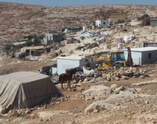
Israeli soldiers invaded, Wednesday, Maser Yatta area, south of Hebron city in the southern part of the occupied Wet Bank, before demolishing several residential sheds and tents, and abducted two Palestinians.
Rateb Jabour, the coordinator of the National and Popular Committee against the Annexation Wall and Colonies, said the soldiers demolished a tent and a shed, owned by Maher al-Hamamda, in the al-Maqfara area.
Jabour added that the soldiers also demolished one residential shed, owned by Mahmoud Hussein Hamamda, in the same area.
In addition, the soldiers confiscated a car, owned by Masafer Yatta Village Council, in addition to destroying a water network extending from the Tiwani village to Masafer Yatta.
The soldiers also destroyed solar panels in the Zakeer area, and two residential room in Khallet ad-Dabe’ area.
Furthermore, the soldiers abducted the head of the Tiwani Village Council, Mohammad Rib’ey, in addition to Bakr Fadel Rib’ey.
It is worth mentioning that the soldiers also invaded many communities, south of Hebron, searched homes, tents and cave, in areas between the illegal Ma’on and Avigal colonies.
Rateb Jabour, the coordinator of the National and Popular Committee against the Annexation Wall and Colonies, said the soldiers demolished a tent and a shed, owned by Maher al-Hamamda, in the al-Maqfara area.
Jabour added that the soldiers also demolished one residential shed, owned by Mahmoud Hussein Hamamda, in the same area.
In addition, the soldiers confiscated a car, owned by Masafer Yatta Village Council, in addition to destroying a water network extending from the Tiwani village to Masafer Yatta.
The soldiers also destroyed solar panels in the Zakeer area, and two residential room in Khallet ad-Dabe’ area.
Furthermore, the soldiers abducted the head of the Tiwani Village Council, Mohammad Rib’ey, in addition to Bakr Fadel Rib’ey.
It is worth mentioning that the soldiers also invaded many communities, south of Hebron, searched homes, tents and cave, in areas between the illegal Ma’on and Avigal colonies.
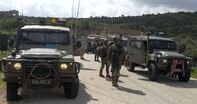
Israeli occupation forces (IOF) on Wednesday afternoon stormed Jabal al-Mawalih area in Bethlehem.
Local sources said that the IOF raided a bakery owned by a Palestinian resident and wreaked havoc on it.
They added that the IOF soldiers, after searching the bakery, deployed in the neighboring areas and searched other places. No reasons were given for the campaign.
Local sources said that the IOF raided a bakery owned by a Palestinian resident and wreaked havoc on it.
They added that the IOF soldiers, after searching the bakery, deployed in the neighboring areas and searched other places. No reasons were given for the campaign.
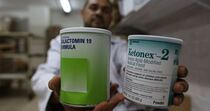
The Palestinian Non-governmental Organizations Network on Tuesday released a report on the acute shortage of medicines and medical supplies in the NGOs working in the health sector in the Gaza Strip and its implications on their interventions and responses to the needs of patients and other groups.
The report says that health NGOs in the Gaza Strip work under a crippling blockade imposed by Israel on the enclave since 2006 and suffer from a severe lack of medical supplies. It highlights that the crisis has worsened following the launch of the Great March of Return.
The high number of martyrs and wounded marches and the lack of supply have caused a serious deterioration in the situation.
The paper shows the results of a survey prepared by the Palestinian Non-governmental Organizations Network in August 2019 in the Gaza Strip, which included eight NGOs in the health sector, on the shortage of medicines and medical consumables and its impact on the target groups.
It turns out that 40% of the medicines are not found in stores while 45% will run out after three months. As for the medical consumables, the total deficit is 55%.
The Palestinian Non-governmental Organizations Network called for a serious action toward lifting the Israeli siege on the Gaza Strip and allowing the entry of all medicines and medical supplies into the coastal enclave as soon as possible.
It also called for facilitating the movement of the patients, particularly those who need treatment abroad, and providing financial support to the health institutions in Gaza so that they could complete their role in offering the necessary health services to the Palestinians living in the seaside area.
The report says that health NGOs in the Gaza Strip work under a crippling blockade imposed by Israel on the enclave since 2006 and suffer from a severe lack of medical supplies. It highlights that the crisis has worsened following the launch of the Great March of Return.
The high number of martyrs and wounded marches and the lack of supply have caused a serious deterioration in the situation.
The paper shows the results of a survey prepared by the Palestinian Non-governmental Organizations Network in August 2019 in the Gaza Strip, which included eight NGOs in the health sector, on the shortage of medicines and medical consumables and its impact on the target groups.
It turns out that 40% of the medicines are not found in stores while 45% will run out after three months. As for the medical consumables, the total deficit is 55%.
The Palestinian Non-governmental Organizations Network called for a serious action toward lifting the Israeli siege on the Gaza Strip and allowing the entry of all medicines and medical supplies into the coastal enclave as soon as possible.
It also called for facilitating the movement of the patients, particularly those who need treatment abroad, and providing financial support to the health institutions in Gaza so that they could complete their role in offering the necessary health services to the Palestinians living in the seaside area.
9 sept 2019

The Israel Electric Corporation (IEC) threatened that it will begin cutting off the electricity supply to the Palestinian Authority (PA) after the upcoming September 17th Israeli elections due to ‘outstanding debts’, Kan Israeli website reported Sunday.
According to the website, the IEC will discontinue the electricity supply to Palestinian villages in the West Bank to put pressure on the Palestinian Authority to pay its 1.7 billion New Israeli Shekel (NIS) debt.
2 weeks ago, the IEC reportedly notified Israeli Prime Minister Benjamin Netanyahu, the Minister of Finance, the Minister of Energy, the Electricity Authority, and the Coordinator of Government Activities in the Territories about the decision to stop the electricity supply because of the PA’s outstanding debt.
An Israeli High Court decision, 2 months ago stated that starting from the date of the notification to the relevant parties, the IEC has to wait 35 days until being permitted to cut off the electricity supply.
In August of 2018, it was reported in the Marker newspaper that the Israeli Ministry of Finance is moving to transfer an estimated NIS 500 million to the electricity company from the Palestinian tax funds collected by the occupation authorities, claiming to pay the accumulated debts of the Palestinian Authority to the IEC.
In response, the Head of the Palestinian Energy Authority, Thafer Melhem denied all claims of accumulated debts by the Palestinian Electricity Company to the tune of 1.7 billion shekels.
Melhem explained that there are only debts accumulated on the Al-Quds electricity company, worth 600 million shekels, and that within the 2016 agreement, the company is scheduling these debts, but, according to Melhem, Israel withdrew from this agreement.
Israel asked the PA to pay the remaining amount owing immediately, threatening that otherwise, the power will be cut off from the Jerusalem Electricity Company covered regions after two weeks.
Following threats: PA denies claims of debts to the Israel Electric Corporation
The Israel Electric Corporation (IEC) threatened that it will begin cutting off the electricity supply to the Palestinian Authority after the upcoming September 17 elections due to ‘outstanding debts’, Kan Israeli website said on Sunday.
According to the website, IEC will cut off the electricity supply to Palestinian villages in the West Bank to put pressure on the PA to pay its NIS 1.7 billion electric bill.
Two weeks ago, the IEC has reportedly notified Israeli Prime Minister Benjamin Netanyahu, the ministers of finance and energy, the Electricity Authority and the Coordinator of Government Activities in the Territories about the decision to cut off the electricity supply due to the PA’s debt.
A High Court decision two months ago stated that starting from the date of the notification to the relevant parties, the IEC has to wait 35 days until being permitted to cut off the electricity supply.
Last August, it was reported in the Marker newspaper that the Israeli Ministry of Finance is moving to transfer an estimated NIS 500 million to the electricity company from the Palestinian tax funds collected by the occupation authorities, claiming to pay the accumulated debts of the Palestinian Authority to the IEC.
In response, Head of the Palestinian Energy Authority, Thafer Melhem denied claims of accumulate debts by the Palestinian Electricity Company to the tune of 1.7 billion shekel.
Melhem explained that there are only debts accumulated on the Al-Quds electricity company, worth 600 million shekels, and that within the 2016 agreement, the company is scheduling these debts, but new, according to Melhem, Israel retracted from this agreement, and asked to pay the remaining amount at once, threatening that otherwise, the power will be cut off from the Jerusalem Electricity Concession areas after two weeks.
In addition, Melhem told Voice of Palestine radio that the PA Energy Authority and Massader are about to put the final touches to their ongoing negotiations to start construction of a new power plant in Jenin, which will be the largest in the PA, as soon as possible, SAWA reported.
The Power Plant will be a gas fired Combined Cycle Gas Turbine (CCGT) with a generation capacity of approximately 450 megawatts, supplied by natural gas from the Gaza Marine gas field.
According to the website, the IEC will discontinue the electricity supply to Palestinian villages in the West Bank to put pressure on the Palestinian Authority to pay its 1.7 billion New Israeli Shekel (NIS) debt.
2 weeks ago, the IEC reportedly notified Israeli Prime Minister Benjamin Netanyahu, the Minister of Finance, the Minister of Energy, the Electricity Authority, and the Coordinator of Government Activities in the Territories about the decision to stop the electricity supply because of the PA’s outstanding debt.
An Israeli High Court decision, 2 months ago stated that starting from the date of the notification to the relevant parties, the IEC has to wait 35 days until being permitted to cut off the electricity supply.
In August of 2018, it was reported in the Marker newspaper that the Israeli Ministry of Finance is moving to transfer an estimated NIS 500 million to the electricity company from the Palestinian tax funds collected by the occupation authorities, claiming to pay the accumulated debts of the Palestinian Authority to the IEC.
In response, the Head of the Palestinian Energy Authority, Thafer Melhem denied all claims of accumulated debts by the Palestinian Electricity Company to the tune of 1.7 billion shekels.
Melhem explained that there are only debts accumulated on the Al-Quds electricity company, worth 600 million shekels, and that within the 2016 agreement, the company is scheduling these debts, but, according to Melhem, Israel withdrew from this agreement.
Israel asked the PA to pay the remaining amount owing immediately, threatening that otherwise, the power will be cut off from the Jerusalem Electricity Company covered regions after two weeks.
Following threats: PA denies claims of debts to the Israel Electric Corporation
The Israel Electric Corporation (IEC) threatened that it will begin cutting off the electricity supply to the Palestinian Authority after the upcoming September 17 elections due to ‘outstanding debts’, Kan Israeli website said on Sunday.
According to the website, IEC will cut off the electricity supply to Palestinian villages in the West Bank to put pressure on the PA to pay its NIS 1.7 billion electric bill.
Two weeks ago, the IEC has reportedly notified Israeli Prime Minister Benjamin Netanyahu, the ministers of finance and energy, the Electricity Authority and the Coordinator of Government Activities in the Territories about the decision to cut off the electricity supply due to the PA’s debt.
A High Court decision two months ago stated that starting from the date of the notification to the relevant parties, the IEC has to wait 35 days until being permitted to cut off the electricity supply.
Last August, it was reported in the Marker newspaper that the Israeli Ministry of Finance is moving to transfer an estimated NIS 500 million to the electricity company from the Palestinian tax funds collected by the occupation authorities, claiming to pay the accumulated debts of the Palestinian Authority to the IEC.
In response, Head of the Palestinian Energy Authority, Thafer Melhem denied claims of accumulate debts by the Palestinian Electricity Company to the tune of 1.7 billion shekel.
Melhem explained that there are only debts accumulated on the Al-Quds electricity company, worth 600 million shekels, and that within the 2016 agreement, the company is scheduling these debts, but new, according to Melhem, Israel retracted from this agreement, and asked to pay the remaining amount at once, threatening that otherwise, the power will be cut off from the Jerusalem Electricity Concession areas after two weeks.
In addition, Melhem told Voice of Palestine radio that the PA Energy Authority and Massader are about to put the final touches to their ongoing negotiations to start construction of a new power plant in Jenin, which will be the largest in the PA, as soon as possible, SAWA reported.
The Power Plant will be a gas fired Combined Cycle Gas Turbine (CCGT) with a generation capacity of approximately 450 megawatts, supplied by natural gas from the Gaza Marine gas field.
8 sept 2019
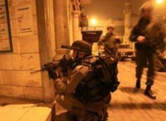
Israeli soldiers confiscated, Saturday, two electricity generators in Wad az-Zarzeer area, and abducted one Palestinian near the Ibrahimi Mosque, in Hebron city, in the southern part of the occupied West Bank.
Several army jeeps and armored vehicles invaded Wad az-Zarzeer area before the soldiers broke into a property, owned by a Palestinian family, and confiscated two electricity generators, which he placed on his land.
The soldiers also abducted, Nabeeh Taha Abu Sneina, while walking near the Ibrahimi Mosque, in the Old City of Hebron, and took him to an unknown destination.
Several army jeeps and armored vehicles invaded Wad az-Zarzeer area before the soldiers broke into a property, owned by a Palestinian family, and confiscated two electricity generators, which he placed on his land.
The soldiers also abducted, Nabeeh Taha Abu Sneina, while walking near the Ibrahimi Mosque, in the Old City of Hebron, and took him to an unknown destination.
7 sept 2019
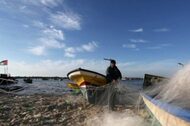
Israeli navy ships opened fire, on Friday evening, on several Palestinian fishing boats in the Sudaniyya Sea area, northwest of Gaza city.
Media sources said the boats were in Palestinian waters when the navy attacked and opened fire on them.
The attack did not lead to casualties, but forced the fishermen back to the shore to avoid further escalating from the navy.
Also on Friday, Israeli soldiers attacked the Great Return March processions in the Gaza Strip killing two children, and wounding 81 civilians, including 38 journalists, one journalist and two paramedics.
Media sources said the boats were in Palestinian waters when the navy attacked and opened fire on them.
The attack did not lead to casualties, but forced the fishermen back to the shore to avoid further escalating from the navy.
Also on Friday, Israeli soldiers attacked the Great Return March processions in the Gaza Strip killing two children, and wounding 81 civilians, including 38 journalists, one journalist and two paramedics.
5 sept 2019
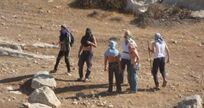
Extremist Israeli settlers last night chopped down Palestinian-owned olive trees in Burin village, in the northern occupied West Bank district of Nablus, only days after they set fire to other trees in the same fields, reported Ghassan Daghlas, a Palestinian official who monitors settlement activity.
He told WAFA that a number of settlers from the illegal settlement of Yitzhar sneaked into the land in the village during the night and started to cut down the trees.
He pointed out that the settlers were riding motorcycles in the area, part of which has been seized by the settlers and planted with grape vines.
Palestinians often complain that settlers’ vandalism of Palestinian property and attacks against the civilian population is rampant in the occupied West Bank and often done under the eyes of the Israeli army.
Several Palestinians were killed, some burnt alive, in attacks by settlers and hundreds of dunums of land planted with olive and other trees were torched and destroyed by the settlers without anyone being detained or tried for their actions.
He told WAFA that a number of settlers from the illegal settlement of Yitzhar sneaked into the land in the village during the night and started to cut down the trees.
He pointed out that the settlers were riding motorcycles in the area, part of which has been seized by the settlers and planted with grape vines.
Palestinians often complain that settlers’ vandalism of Palestinian property and attacks against the civilian population is rampant in the occupied West Bank and often done under the eyes of the Israeli army.
Several Palestinians were killed, some burnt alive, in attacks by settlers and hundreds of dunums of land planted with olive and other trees were torched and destroyed by the settlers without anyone being detained or tried for their actions.
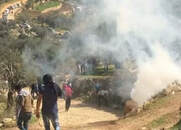
Dozens of Palestinians suffered the severe effects of teargas inhalation, on Wednesday evening, after Israeli soldiers attacked them when they intercepted a group of illegal colonialist settlers who invaded their lands, and burnt olive trees, in Madama village, south of the northern West Bank city of Nablus.
Ehab al-Qet, a member of Madama Village Council, told the Palestinian News & Info Agency (WAFA), that the colonists attacked the southern area of the village, before local youngsters incepted them and started throwing stones at them.
He added that many soldiers were in the area with the colonists and started firing a barrage of gas bombs at the villagers, causing dozens to suffer the effects of teargas inhalation.
Al-Qet also said that the colonists set many olive trees ablaze, while the soldiers prevented the Palestinians from reaching their orchards to extinguish the fire.
Settlers attack Palestinians, their property in Nablus towns
Hordes of extremist Jewish settlers on Wednesday evening attacked Palestinian citizens and their property in Madama and Burin town, south of Nablus in the occupied West Bank.
According to local sources, dozens of settlers from Yitzhar settlement stormed the southern area of Madama under security and military protection and embarked on burning and destroying several olive trees.
Later, some local residents from Madama tried to confront the settlers before soldiers intervened and fired volleys of tear gas canisters at the latter, causing them to suffer from injuries.
In a separate incident, settlers from the same settlements infiltrated overnight into the nearby town of Burin and wreaked havoc on several olive trees.
Ehab al-Qet, a member of Madama Village Council, told the Palestinian News & Info Agency (WAFA), that the colonists attacked the southern area of the village, before local youngsters incepted them and started throwing stones at them.
He added that many soldiers were in the area with the colonists and started firing a barrage of gas bombs at the villagers, causing dozens to suffer the effects of teargas inhalation.
Al-Qet also said that the colonists set many olive trees ablaze, while the soldiers prevented the Palestinians from reaching their orchards to extinguish the fire.
Settlers attack Palestinians, their property in Nablus towns
Hordes of extremist Jewish settlers on Wednesday evening attacked Palestinian citizens and their property in Madama and Burin town, south of Nablus in the occupied West Bank.
According to local sources, dozens of settlers from Yitzhar settlement stormed the southern area of Madama under security and military protection and embarked on burning and destroying several olive trees.
Later, some local residents from Madama tried to confront the settlers before soldiers intervened and fired volleys of tear gas canisters at the latter, causing them to suffer from injuries.
In a separate incident, settlers from the same settlements infiltrated overnight into the nearby town of Burin and wreaked havoc on several olive trees.
3 sept 2019
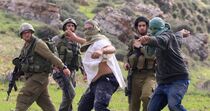
An Israeli settler on Tuesday opened fire at Palestinian citizens north of the West Bank city of Nablus.
Anti-settlement activist Ghassan Daghlas said that an Israeli settler opened fire at a group of Palestinian vendors in an area between Burqa and Bizzariya villages. No injuries were reported.
There are about 503 Israeli settler outposts built randomly in the West Bank and Jerusalem. Nearly 800,000 settlers live there and attack the Palestinians on almost a daily basis.
Anti-settlement activist Ghassan Daghlas said that an Israeli settler opened fire at a group of Palestinian vendors in an area between Burqa and Bizzariya villages. No injuries were reported.
There are about 503 Israeli settler outposts built randomly in the West Bank and Jerusalem. Nearly 800,000 settlers live there and attack the Palestinians on almost a daily basis.
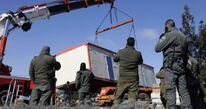
Israeli settlers on Tuesday morning erected a caravan on a newly seized Palestinian land in Beit Jala town, west of Bethlehem.
Local sources said that the four-dunum land, owned by the Palestinian citizen Saba Skandar, was seized by the Israeli authorities on Monday without prior notice.
The sources said that the land was surrounded by barbed wire, and a generator and other electronic devices were brought to the caravan.
Journalists were prevented from approaching the area, they added.
Local sources said that the four-dunum land, owned by the Palestinian citizen Saba Skandar, was seized by the Israeli authorities on Monday without prior notice.
The sources said that the land was surrounded by barbed wire, and a generator and other electronic devices were brought to the caravan.
Journalists were prevented from approaching the area, they added.

A horde of armed Jewish settlers on Monday appropriated and bulldozed a Palestinian-owned tract of agricultural land in Beit Jala town, west of Bethlehem in the occupied West Bank.
Local official Hasan Berijiya said that bulldozers escorted by a group of settlers carrying weapons stormed the agricultural area of al-Makhrour in the town and embarked on razing four dunums of land belonging to a local resident called Saba Iskandar.
Berijiya added that the settlers wanted to place mobile homes on this piece of land.
He noted that the seized land is located near the Palestinian restaurant and the house that had been demolished about a week ago by the Israeli occupation authority.
Local official Hasan Berijiya said that bulldozers escorted by a group of settlers carrying weapons stormed the agricultural area of al-Makhrour in the town and embarked on razing four dunums of land belonging to a local resident called Saba Iskandar.
Berijiya added that the settlers wanted to place mobile homes on this piece of land.
He noted that the seized land is located near the Palestinian restaurant and the house that had been demolished about a week ago by the Israeli occupation authority.

The Israeli occupation authority (IOA) said it would annex hundreds of dunums of Palestinian land in Jinsafut town, east of Qalqilya, to build a road for nearby settlements.
According to local sources, the IOA told the Palestinian side of its plan to annex 1,000 dunums of land to build the road.
The Israeli plan would lead to uprooting dozens of olive trees and dismembering Palestinian-owned lands in the area.
Chief of the Jinsafut local council Eid Eid said the road would connect the illegal settlements in the area with each other and deprive Palestinian farmers of their lands.
According to local sources, the IOA told the Palestinian side of its plan to annex 1,000 dunums of land to build the road.
The Israeli plan would lead to uprooting dozens of olive trees and dismembering Palestinian-owned lands in the area.
Chief of the Jinsafut local council Eid Eid said the road would connect the illegal settlements in the area with each other and deprive Palestinian farmers of their lands.
Page: 35 - 34 - 33 - 32 - 31 - 30 - 29 - 28 - 27 - 26 - 25 - 24 - 23 - 22 - 21 - 20 - 19 - 18 - 17 - 16 - 15 - 14
